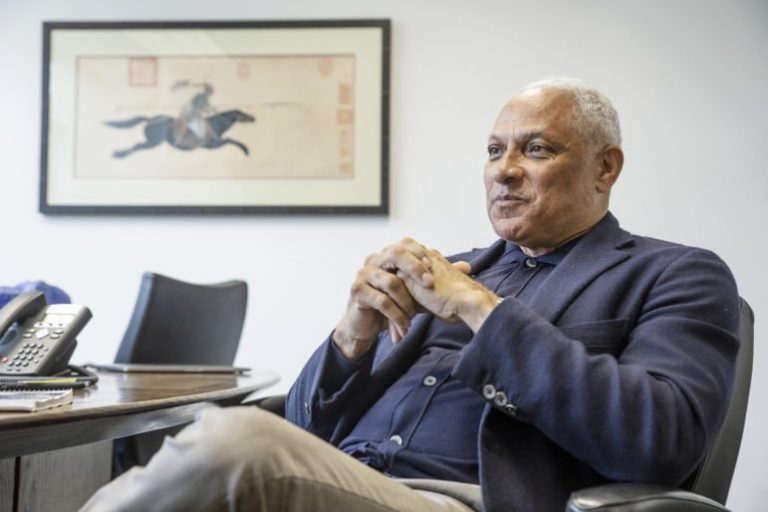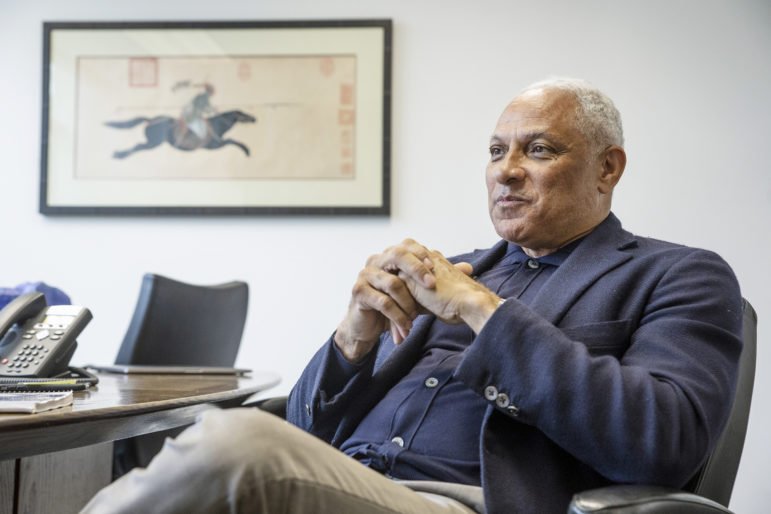

Eric J. Shelton/Mississippi Today, Report For America
Mike Espy, a former congressman and former U.S. agriculture secretary, announces that he is running against U.S. Sen. Cindy Hyde-Smith in 2020 for her Senate seat.
Democrat Mike Espy raised nearly three times the money Republican incumbent U.S. Sen. Cindy Hyde-Smith raised in the second quarter of 2020, according to campaign finance reports released on Tuesday evening.
Espy raised $610,000 between April 1 and June 30. Hyde-Smith raised just $212,000 in that same period. Despite her poor second quarter, Hyde-Smith has still raised more money than Espy this campaign cycle: $2.1 million to Espy’s $1.4 million.
The November general election is a rematch between the two candidates, who squared off in a 2018 special election to fill the seat of the late U.S. Sen. Thad Cochran. Hyde-Smith defeated Espy in a runoff by eight points — the closest a Democrat has come to the U.S. Senate in the modern political era.

Eric J. Shelton, Mississippi Today/ Report for America
Cindy Hyde-Smith, right, is congratulated by her daughter, Anna-Michael Smith, after winning the Senate runoff election against Mike Espy Tuesday, November 27, 2018.
This campaign cycle, Hyde-Smith has raised less money than every incumbent U.S. senator who isn’t retiring, according to the Center for Responsive Politics. One reason for her struggle to raise money is backlash following racially insensitive comments she made late in the 2018 special election.
Hyde-Smith made several remarks on the trail — including saying she would attend a “public hanging” — that garnered national scrutiny and inspired numerous corporate political committees to ask Hyde-Smith to return their previous contributions. Some of those PACs included Major League Baseball, AT&T, Union Pacific, Aetna, Pfizer, Google and Facebook.
As the candidates ramp up their campaigns ahead of the November election, race will continue to shape the political narrative. The death of George Floyd at the hands of Minneapolis police has inspired a national movement that has reached the state of Mississippi in profound and historic ways.
After tens of thousands have marched dozens of Mississippi cities’ streets in protest, local governments across the state have toppled Confederate iconography. The Mississippi Legislature, after decades of apprehension, voted last month to remove the state flag, the last in the nation featuring the Confederate battle emblem.
Espy, who in the 1990s became the first black congressman elected in Mississippi since Reconstruction, has framed his campaign messaging around his family’s contribution to racial justice and the demands of Black Lives Matter organizers. He’s criticized Hyde-Smith in recent days for her ties to Confederate imagery, and he’s highlighted her silence on the contentious debate over whether to change the state flag.
Successful fundraising, while vital to statewide candidates, does not necessarily translate to broad support at the polls, as Espy knows better than anyone. In 2018, Espy raised $7.5 million compared to $5.5 million for the victorious Hyde-Smith. Though he lost, he became the first Democrat in several statewide elections to outraise a Republican opponent.
One advantage to fundraising success could become national attention. After Hyde-Smith’s controversial comments came to light in the 2018 election, national reporters flocked to the state to cover the possibility of a Democrat swiping a Senate seat from the Republican Party. And as debate across the nation rages regarding racial inequities and unequal representation in government, the race could again draw national headlines and additional fundraising success for Espy.
Exactly how much national attention and funding will pour into the Mississippi race remains to be seen. In the 2020 presidential election year, Democratic Senate candidates in several Republican-controlled states are getting media attention and focused national funds as pundits believe Democrats have a shot to gain majority control of the U.S. Senate. So far this year, Espy and Mississippi have largely missed that connection.
But Democratic National Committee Chairman Tom Perez told Mississippi Today in late 2019 the national party would invest in Mississippi for the third straight election year.
The post Democrat Mike Espy outraises GOP Sen. Cindy Hyde-Smith nearly 3-to-1 appeared first on Mississippi Today.
- Scott Colom raised most money, but Cindy Hyde-Smith has most cash before March primary - February 21, 2026
- Patients face canceled surgeries and delayed care amid UMMC cyberattack - February 20, 2026
- Goal is ‘better alignment, not bigger government’ for Mississippi tourism - February 20, 2026